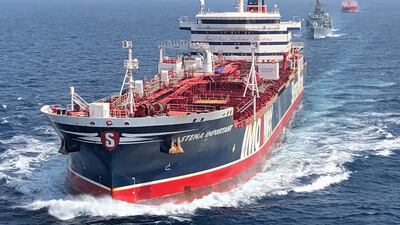The deep divisions that are emerging between the US and Europe over providing better protection for shipping in the Gulf will be viewed with enormous satisfaction in Tehran.
Ever since the Trump administration announced its decision to withdraw from the controversial nuclear deal with Iran, the regime in Tehran has been working hard to encourage the Europeans to distance themselves from Washington’s confrontational approach.
In particular, Iran has sought to persuade the three European signatories to the nuclear deal – Britain, France and Germany – that it can be saved, so long as they remain committed to upholding it.
And in that context, the escalating tensions between Washington and Europe over increasing protection for merchant shipping in the Gulf will encourage the Iranian regime that its strategy is paying dividends.
Divisions between the US and Europe have come to the fore over American calls for European nations to contribute to plans to set up a naval protection force in the Gulf.
The Americans have been keen for Europe and other nations, such as Japan, that rely heavily on oil and gas exports from the Gulf for their energy needs to support Operation Sentinel, the US-led naval protection mission designed to prevent Iran from carrying out further attacks against merchant shipping in the region.
Washington has increased its military presence following a number of confrontations with Iran's Islamic Republican Guard Corps, including the shooting down of a US Navy drone that was operating in international waters in the Strait of Hormuz by an Iranian missile.
But while Washington lost no time in deploying an aircraft carrier as well as more troops, missiles and stealth fighters to reinforce its military presence, the US has been unimpressed by the response of other nations, particularly in Europe, to improve security against further provocative acts by Iran.
The need for an enhanced naval presence, moreover, became even more acute after Iranian forces captured the British-registered oil tanker Stena Impero and took it to the port of Bandar Abbas, where it is now being held.
Washington’s frustration at the failure of the British government, which only had a single frigate operating in the Gulf at the time the ship was seized, to make better provision for protecting British shipping was reflected in comments made by American Secretary of State Mike Pompeo, who caustically remarked: “The responsibility in the first instance falls to the United Kingdom to take care of their ships.”
In the wake of that incident, the US is intensifying the pressure on its European allies to do more, with the aim of persuading Britain, Germany and France to join the US in a mission to secure the Strait of Hormuz against further acts of Iranian aggression.
The Americans argue, quite reasonably, that, as Europe is far more reliant on the Gulf for its energy supplies, it should contribute more to the burden of making sure no further disruption takes place to this vital shipping route.
But the Europeans are proving reluctant to respond positively to the American request, fearing that to do so would indicate to Tehran that they support the Trump administration’s more confrontational stance, thereby scuppering their hopes of saving the deal.
Now the tensions have broken out into the open after Washington made a direct appeal to Germany to become involved in the protection operation.
“We’ve formally asked Germany to join France and the UK to help secure the Strait of Hormuz and combat Iranian aggression,” said a spokeswoman for the US embassy in Berlin. “Members of the German government have been clear that freedom of navigation should be protected. Our question is, protected by whom?”
Relations between the Trump administration and Germany are not good at the best of times, with the American president regularly chastising German Chancellor Angela Merkel over her country’s failure to meet its Nato spending commitments.
By making public Washington’s request for Germany to contribute to the naval mission – similar requests to Britain and France have been made through more discreet diplomatic channels – Mr Trump appears to be trying to embarrass the Germans into taking action.
But if that is Washington’s intention, then the ploy has received short shrift in Berlin, where there is considerable opposition within Mrs Merkel’s ruling coalition, especially among the Social Democrats (SDP), to getting involved. Explaining his party’s opposition to supporting the American initiative, Nils Schmid, the SPD’s foreign affairs spokesman, said he rejected German participation in Operation Sentinel because “there is a risk of being pulled into war against Iran on the side of the United States”. His views were supported by Olaf Scholz, the German Vice Chancellor, who is standing in for Mrs Merkel while she is away. He publicly confirmed that his country would not take part in a US-led naval taskforce, warning of the danger of the world "sleepwalking into a much larger conflict".
Not surprisingly Berlin’s outright rejection of Washington’s request for assistance has not gone down well with the Trump administration, which has called on Germany, the economic powerhouse of Europe, to accept its global responsibilities.
With European countries reluctant to join the American mission, attempts are now underway for a European naval force to undertake the role, with Britain playing the lead in trying to persuade France and Germany to participate.
In the meantime, Iran will take heart from the fact that, to judge by the increasingly acrimonious diplomatic spat between America and Europe on the issue of enhanced protection for Gulf shipping, its attempts to cause divisions in the transatlantic alliance appear to be having the desired effect.
Con Coughlin is the Daily Telegraph’s defence and foreign affairs editor


